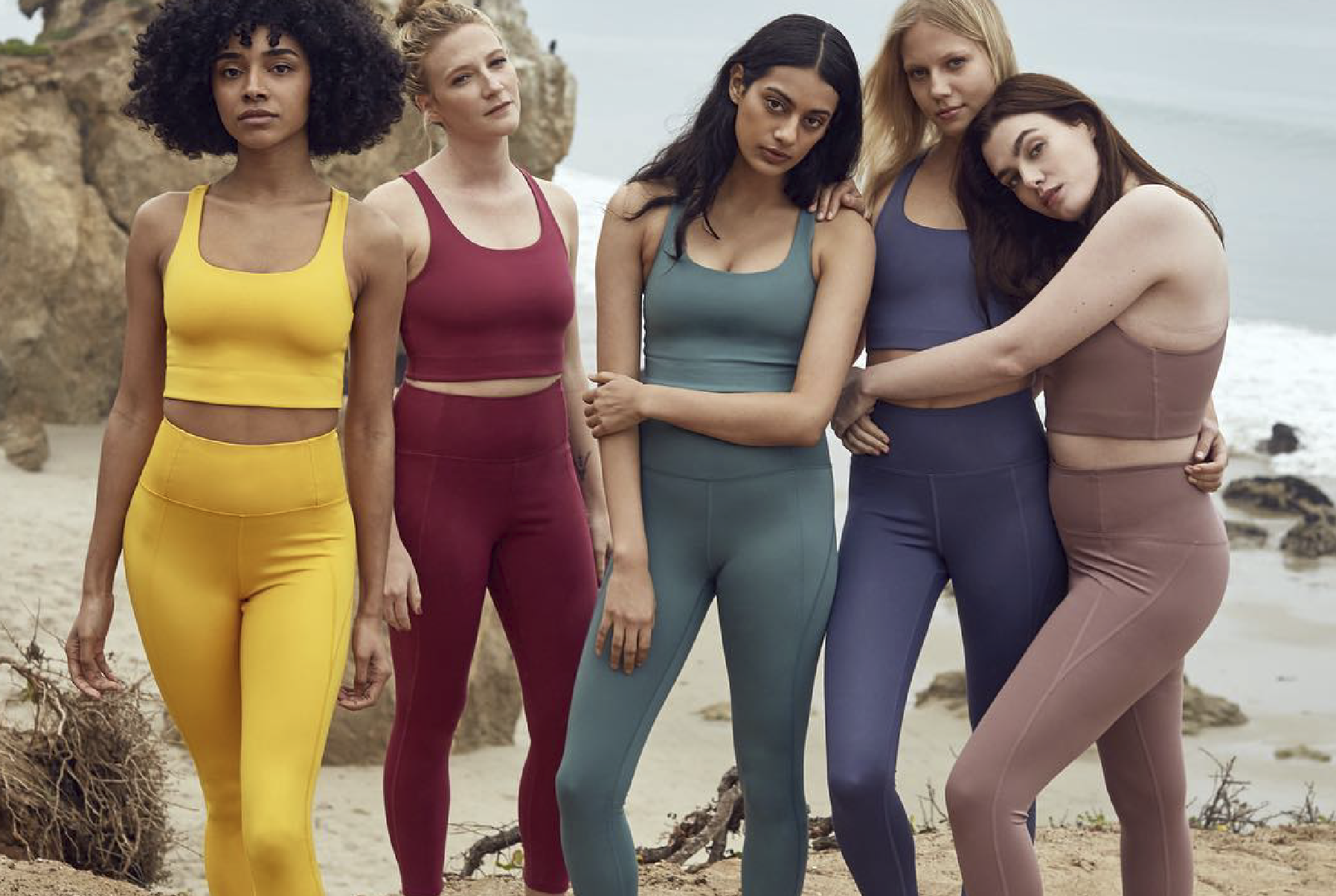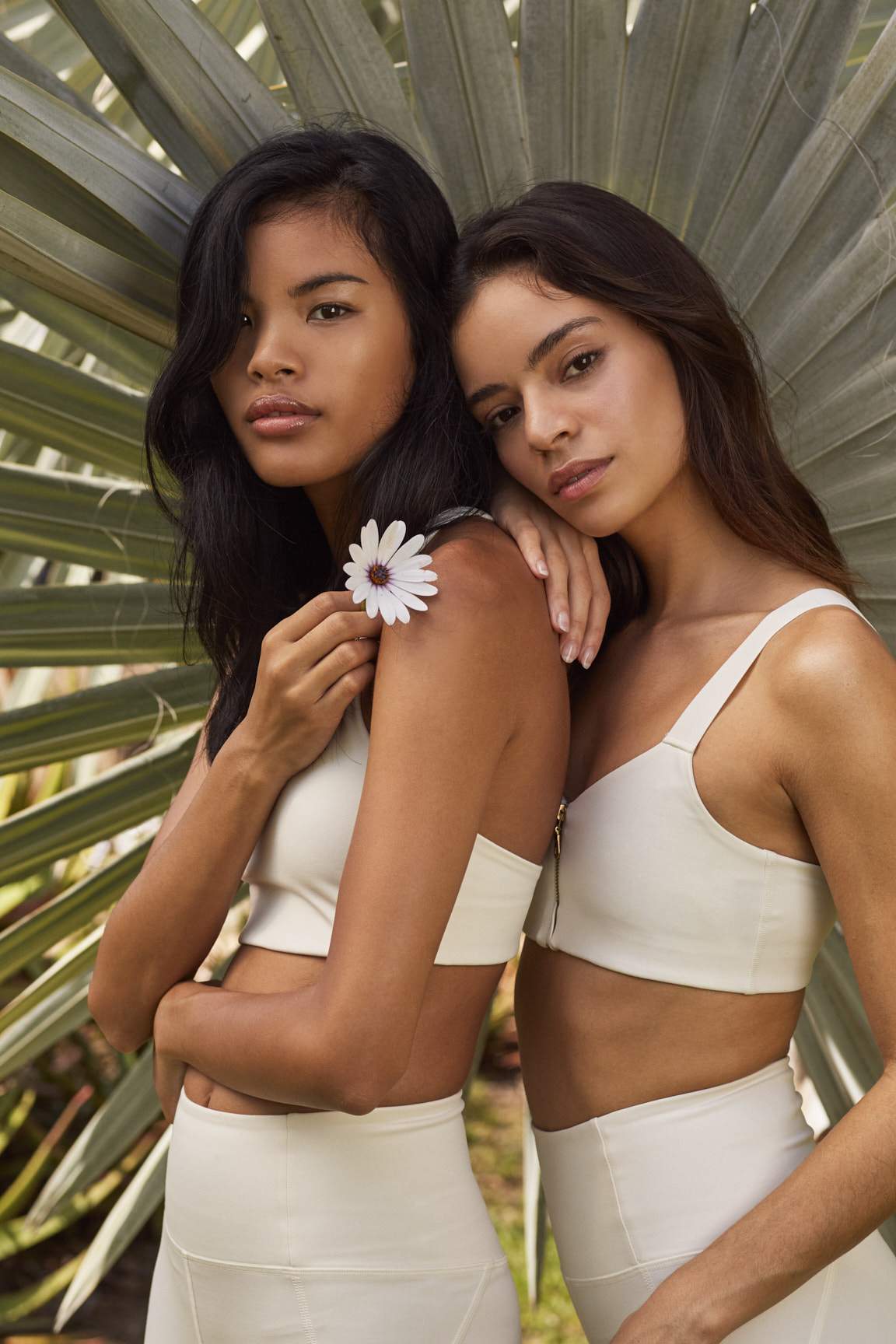Girlfriend Collective
Husband and wife duo Ellie (with a background in graphic design) and Quang Dinh (with a background in sustainable and organic denim) founded Girlfriend Collective in 2015. The brand has always been about more than just clothes, it´s about taking on the ethics of the clothing industry. When they started Girlfriend Collective their first goal was to be as transparent as possible. So many companies tout transparency but only offer flashy headlines instead of substance. Ellie and Quang chose every part of the process, from the raw materials to the facilities to the partners, with care. Along the way they also discovered that high end fit and feel is not a matter of cost, it’s a matter of time. GF Collective takes the time to make sure every single one of their designs is so beautiful that you won’t cycle through it the next time you look through your closet.
The pieces at GF Collective (Oeko-Tex and Bluesign certifications) are made out of recycled polyester from post-consumer water bottles sourced in Taiwan. Taiwan, a small island nation of 23 million people, used to be called “Garbage Island", but the government saw the danger of ignoring the problem, and through widespread change has transformed Taiwan into a world leader in recycling, with 55% of waste being recycled. Recycling is a community affair in Taiwan. Each night people gather to sort their waste into containers as a community - recyclables, food waste, and garbage. Rather than leave, they stay and talk until the trucks come and pick it up, turning what could be a tedious affair into a connective one. Programs and volunteer groups have sprung up all over Taiwan to help bring this community spirit outside of city centers. Ellie and Quang spent time documenting the Tzu Chi Foundation, which sets up micro-recycling centers in rural areas across Taipei. Run mostly by retired people, they set up drop off points to both give people access and education to recycling, and to promote environmental stewardship in their free time.
After all the bottles are sorted into their respective categories (#1, #2, #3, and #4 plastic), they are sent to their processing centers. GF Collective leggings and bras are made from #1 plastic - or Polyethylene Terephthalate, also known as PET. All polyester yarn and fabric is derived from PET, which does not contain BPA. The bottles are sorted, cleaned, and chipped into feedstock at the center. It’s owned by a respected Taiwanese family that has been at the forefront of the recycling industry for decades. It’s not only trusted by the Taiwanese government, it’s certified by them too. Being government certified means more than just having a certificate hanging on your wall saying that you can process plastic to resell. It means security measures are implemented and each facility is subject to accountability for how much plastic is taken in and how much is shipped out. Why is being certified so important? It is a well-known fact in the recycling industry that in places like China with loose certifications and accountability standards, many will lie about where they get their plastic. It’s actually much easier to buy new plastic water bottles and recycle them, than to collect and sort post-consumer bottles. Often, recyclers will recycle brand new bottles as post-consumer bottles and sell them at a higher price to brands that are trying to use recyclables in their products. Not at GF Collective´s facilty where bales of post-consumer bottles from all over Taiwan arrive. Each bale is weighed and logged. From there the bales go into a steam wash to remove caps and labels. After the caps and labels are removed, the bottles are sorted by color. Clear bottles are used for the fibers, and the colored bottles get sent elsewhere to be processed for myriad other uses.
As soon as the spinning mill takes the delivery of the raw PET chips from the recycling center, the bags of chips go through another wash, and are dried. Once they dry, the chips get sent to storage silos and are sent to a machine where the chips get heated up and extruded into long thick spaghetti like strands. From there, they are chipped down to little pellets. The pellets then get reheated and are extruded again to make superfine threads that are spun together into yarn. From there they are spun onto large bobbins, packaged, and sent to the knitting factory.
GF Collective´s fabric is softer and more stable than your standard single-jersey. This process requires time and precision, which means each of the knitting machines can only produce about 100 pairs-worth of fabric in a 24-hour period. Once the fabric is knit, it gets sent to the dye house. The dyeing process is often environmentally destructive, with many facilities opting for non eco-friendly dyes and chemicals, and choosing to dump wastewater freely into water sources like streams and rivers. If you look at photos of rivers that flow by cities involved in garment manufacturing, you will often notice bright blue or red water that enters the water tables that the community uses. This water not only damages the environment but is extremely harmful to people and crops that depend on their water sources to survive.
At GF Collective´s facility every single drop of water that is used to dye the fabric gets sent to the wastewater treatment plant literally 100 feet away from the machines. There, the water gets treated to separate out the OEKO-certified safe dyes and stray fibers. When everything is separated, the water is measured to make sure it’s safe to release. The devices that measure this are set up to send information in real time to the Taiwanese EPA. With their approval, we discharge the water into a healthy stream where it goes on its merry way. Most facilities also dump dye mud in the landfill, but the dye mud from this factory is sent to a pavement facility, where it’s transformed to be used for paving stones, making sidewalks better for the community.
It doesn’t stop here. GF Collective makes their LITE leggings with ECONYL®, a fiber made from recycled fishing nets and other waste that would otherwise be discarded into oceans and landfills (about 10% of the estimated 14 billion pounds of trash discarded in the ocean annually is made up of abandoned, lost, or discarded fishing gear). By using this recycled material, we help clean our oceans, recycle that waste, and cut out the need for raw materials like crude oil, which are traditionally used in the production of nylon.
Once the fabrics and the yarn are ready it is time for the cutting and sewing. The factory where GF Collective garments are made is owned and operated by a Danish family who’s been in the textile business since 1931. Their SA8000 certified factories are dedicated to people rather than profits, which is why GF Collective partnered with them. The Danish partners opened up the Vietnam facility in 2005 in Hanoi, bringing along with them values that have made them last for so long. This includes making sure every employee is treated with respect and paid a fair and living wage. The factory is managed by a Vietnamese powerhouse of a woman named Hien. Prior to working in the garment industry, she worked at the United Nations Development Program (UNDP). Through the UNDP, she worked for reform in agricultural and rural development in Vietnam, helping rural farmers by organizing and building infrastructure projects and getting them access to new technologies. An SA8000 certification guarantees various important conditions, including no forced or child labor, safe working conditions, and the right to unionize. Employees at the factory are paid at least 125% of the local minimum wage, are given both free catered lunch (and dinner for those who work the evening shifts) instead of just a lunchroom, and guided exercise breaks, because no one likes to stare at a desk all day. They are also given free health check ups every 6 months, as well as health insurance.
As Girlfriend Collective puts it: “We believe the best fashion is not about trends - it's about quality”. By focusing on humane manufacturing, meticulous design, and sustainable materials, we want to create a community of people who care about every step of the process.
Based: Seattle, USA.
Ships to: The USA, Canada, the UK, and Australia.
Products: Ethically made activewear from recycled materials.
Mission: To give people who care about ethically and sustainably produced items more options and places for these kinds of products.
Vision: Girlfriend Collective is a sustainable activewear brand for people who care — care about other people, care about how their clothes are made, and care about making an impact through their purchasing power. Through ethically manufactured activewear, recycled materials, and our ever-growing community, we hope to help people lead more sustainable lives and rethink the activewear industry’s role in saving the earth


